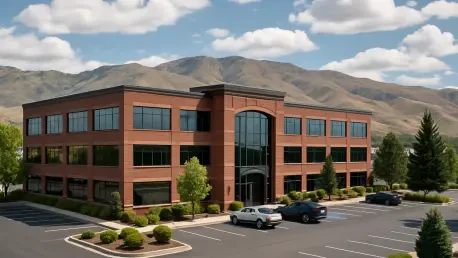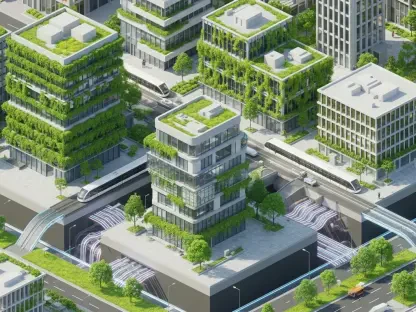Idaho’s commercial real estate market is witnessing an extraordinary surge this year, with bustling activity stretching from the vibrant streets of Boise to the quieter corners of Twin Falls, reflecting a robust economy powered by diverse industries, a growing population, and a business-friendly environment. This remarkable growth isn’t merely a fleeting trend but a testament to the state’s appeal. As companies ranging from small startups to large corporations flock to the Gem State, the demand for office spaces, industrial facilities, retail storefronts, and even undeveloped land has reached unprecedented heights. Transactions reported in early November paint a vivid picture of a market thriving across all sectors, with major real estate firms facilitating deals at a rapid pace. What forces are fueling this dynamic expansion? A closer look reveals a combination of economic vitality, strategic geographic advantages, and market stability as key contributors. This exploration aims to unpack the underlying drivers, offering insight into why Idaho has become a prime destination for commercial investment and growth. The story of this boom is one of opportunity and resilience, reflecting a state poised to sustain its momentum as a hub for business and innovation.
Economic Vitality and Industry Diversity
Idaho’s economy is a powerhouse driving the commercial real estate boom, with a broad spectrum of industries contributing to the surge in demand for property. The state has become a magnet for sectors such as logistics, manufacturing, professional services, and retail, each carving out significant space in the market. Industrial properties, in particular, are seeing intense interest, exemplified by large-scale leases like the 56,936-square-foot deal secured by TMOD, LLC in Caldwell. Such transactions highlight a growing need for facilities that support e-commerce and supply chain operations, aligning with national trends where industrial spaces are pivotal to meeting consumer demands in a digital age. This economic diversity ensures that the real estate market isn’t reliant on a single sector, providing a sturdy foundation for sustained growth. The influx of businesses across various fields underscores Idaho’s appeal as a place where companies can thrive, pushing property demand to new heights.
Beyond industrial growth, the retail and professional sectors are also flourishing, adding layers to the state’s commercial landscape. Retail spaces are experiencing a renaissance, with leases spanning from small specialty shops to expansive storefronts like Meridian Ace Hardware’s 20,173-square-foot location. This variety indicates that physical retail remains a viable and attractive option for businesses despite the rise of online shopping. Simultaneously, office spaces are in demand as professional services expand, with notable growth among firms like Dorsey & Whitney, LLP, which recently added significant square footage in Boise. These developments reflect a balanced economic environment where multiple industries coexist and prosper, fueling a consistent need for diverse commercial properties. This multifaceted economic base not only drives transactions but also positions Idaho as a resilient market capable of weathering broader economic shifts.
Geographic Advantages and Regional Spread
A critical factor propelling Idaho’s commercial real estate market is its strategic geographic position, which offers unique advantages to businesses. Boise, as the state’s capital and economic center, naturally anchors much of the activity, drawing companies with its growing population and supportive business climate. The city hosts a high volume of transactions across office, retail, and industrial categories, serving as a focal point for commercial investment. However, the appeal extends far beyond Boise’s borders, with smaller cities like Nampa and Caldwell emerging as hotspots for industrial development. Their proximity to major transportation corridors and lower operational costs make them ideal for logistics and manufacturing firms seeking efficient bases. This geographic diversity ensures that growth isn’t concentrated in one area, spreading economic benefits across the state and amplifying demand for commercial spaces in various locales.
Suburban and rural areas are also playing a significant role in this real estate boom, showcasing Idaho’s broad-based attractiveness. Communities like Meridian and Garden City are becoming secondary hubs, drawing retail and office tenants with their accessibility and potential for expansion. Meanwhile, even more remote markets such as Twin Falls and Driggs are reporting noteworthy transactions, often in retail and smaller office spaces, driven by localized economic factors. This widespread activity highlights how Idaho’s varied landscape—from bustling urban centers to quieter rural towns—caters to a range of business needs. The state’s ability to offer both metropolitan advantages and cost-effective alternatives in less densely populated areas creates a unique draw, ensuring that commercial real estate demand remains strong across different regions. This regional spread not only diversifies investment opportunities but also fosters a more inclusive economic growth pattern.
Market Stability and Tenant Confidence
Stability within Idaho’s commercial real estate market is another key driver of its current boom, as evidenced by a high number of lease renewals signaling tenant satisfaction. Businesses are opting to remain in their existing spaces, with significant renewals such as Carollo Engineers, Inc. recommitting to 21,922 square feet in Boise and Polaris Distro, LLC securing 5,000 square feet in Nampa. These decisions suggest that tenants find value in their current locations, whether due to advantageous lease terms, prime positioning, or established customer bases. Such stability reduces vacancy risks for property owners, creating a reliable environment that encourages further investment. This trend of renewals reflects a mature market where companies feel confident in making long-term commitments, further solidifying Idaho’s reputation as a dependable place for business operations.
This confidence among tenants extends across property types, reinforcing the market’s robustness and appeal to new entrants. Retail renewals, like that of Urban Vapor Loft in Meridian, demonstrate that even traditional brick-and-mortar businesses see a sustainable future in their Idaho locations, countering narratives of retail decline. This pattern of staying power indicates a market where existing players are not only surviving but thriving, which in turn attracts additional businesses looking for a secure environment to establish roots. The balance between renewals and new leases paints a picture of a commercial landscape that supports continuity while still offering room for growth. As a result, Idaho’s real estate market benefits from a cycle of trust and reinvestment, where stability begets more activity, drawing in diverse companies eager to capitalize on a proven and steady foundation.
Professional Expertise and Transaction Efficiency
The pivotal role of professional real estate firms is a cornerstone of Idaho’s booming commercial market, facilitating a high volume of transactions with skill and precision. Companies such as TOK Commercial Real Estate, Cushman & Wakefield, and Colliers Paragon are instrumental in connecting landlords and tenants, ensuring deals are executed smoothly across the state. Their expertise in negotiation, valuation, and transaction management is evident in a range of agreements, from expansive industrial leases in Caldwell to boutique retail spaces in Boise. This professional support streamlines the process, making it easier for businesses to find and secure properties that align with their operational needs. The widespread presence of these firms in transactions highlights a market underpinned by trust and knowledge, which is essential for maintaining the rapid pace of activity seen today.
This professionalization not only boosts efficiency but also enhances market accessibility for a variety of players, further driving growth. Whether handling a small office lease in Twin Falls or a major retail deal in Meridian, these firms act as vital intermediaries, bridging gaps between parties and ensuring favorable outcomes. Their involvement reduces friction in complex transactions, allowing businesses to focus on their core operations while real estate professionals manage the intricacies of property deals. This dynamic creates a virtuous cycle where efficient deal-making encourages more businesses to enter the market, confident that expert guidance is available. The influence of these firms underscores a sophisticated commercial environment in Idaho, where specialized services are a key factor in sustaining and accelerating the current boom, making the state an attractive destination for investment.
Adaptability to Evolving Business Demands
Idaho’s commercial real estate market is thriving due to its remarkable adaptability to the evolving needs of modern businesses, ensuring relevance in a changing economic landscape. Industrial spaces are at the forefront, catering to the demands of a digital economy by providing facilities for logistics and production, as seen in large leases across Nampa and Caldwell. Retail properties, meanwhile, are striking a balance between traditional commerce and experiential shopping, with diverse businesses like Henya Sushi in Boise securing spaces that attract foot traffic. This flexibility allows the market to support a wide array of retail models, from niche stores to larger operations, meeting contemporary consumer preferences. Such responsiveness to current trends positions Idaho as a forward-thinking hub, capable of accommodating businesses navigating the complexities of today’s marketplace.
Office spaces also reflect this adaptability, addressing the needs of a hybrid work environment where physical locations remain crucial for collaboration and client engagement. Expansions by professional firms in Boise, alongside smaller leases in suburban areas like Eagle, demonstrate a market that serves both established companies and emerging enterprises. The range of transactions—from modest spaces of a few hundred square feet to sprawling industrial complexes—illustrates an environment accessible to businesses of all sizes. This inclusivity ensures that startups and corporate giants alike can find suitable properties, fostering entrepreneurship and expansion. Idaho’s ability to keep pace with shifting business realities, from remote work dynamics to e-commerce growth, solidifies its status as a prime location for commercial investment, driving sustained interest and activity across the state.
Reflecting on Growth and Future Opportunities
Looking back, Idaho’s commercial real estate market demonstrated exceptional vigor in the early part of this year, with a flurry of transactions that underscored its strength and diversity. Industrial leases, retail renewals, and office expansions painted a picture of a state economy that supported a wide range of industries, from logistics to professional services. The geographic spread of activity, from urban Boise to rural Twin Falls, highlighted a balanced growth pattern that benefited various communities. Professional real estate firms played a crucial role in facilitating these deals, ensuring efficiency and trust in a bustling market. This period of robust activity showcased Idaho’s ability to adapt to modern business needs while maintaining stability through tenant confidence and renewals.
Moving forward, stakeholders should focus on sustaining this momentum by investing in infrastructure that supports continued growth, particularly in transportation and technology to bolster industrial and logistics sectors. Policymakers and developers might consider incentives to attract more diverse businesses to rural areas, further distributing economic benefits. Additionally, maintaining the high level of professional real estate services will be essential to handle future demand and ensure smooth transactions. Exploring sustainable development practices could also position Idaho as a leader in environmentally conscious commercial growth, appealing to forward-thinking companies. These steps, grounded in the insights from recent market trends, offer a pathway to build on past successes, ensuring that the state remains a top destination for commercial real estate investment in the years ahead.









